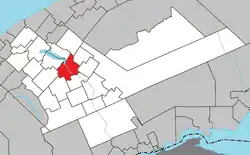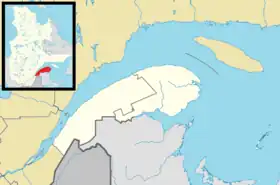Amqui
Amqui (/ɒmkwiː/) is a town in eastern Quebec, Canada, at the base of the Gaspé peninsula in Bas-Saint-Laurent. Located at the confluence of the Humqui and Matapédia Rivers, it is the seat of La Matapédia Regional County Municipality. The main access road is Quebec Route 132.
Amqui | |
|---|---|
 Aerial view of Amqui | |
.svg.png.webp) Coat of arms | |
 Location within La Matapédia RCM. | |
 Amqui Location in eastern Quebec. | |
| Coordinates: 48°28′N 67°26′W[1] | |
| Country | |
| Province | |
| Region | Bas-Saint-Laurent |
| RCM | La Matapédia |
| Settled | 1870s |
| Constituted | January 16, 1991 |
| Government | |
| • Mayor | Sylvie Blanchette |
| • Federal riding | Avignon—La Mitis—Matane—Matapédia |
| • Prov. riding | Matane-Matapédia |
| Area | |
| • Total | 126.80 km2 (48.96 sq mi) |
| • Land | 120.02 km2 (46.34 sq mi) |
| Population | |
| • Total | 5,999 |
| • Density | 49.6/km2 (128/sq mi) |
| • Pop 2016-2021 | |
| • Dwellings | 3,015 |
| Time zone | UTC−5 (EST) |
| • Summer (DST) | UTC−4 (EDT) |
| Postal code(s) | |
| Area codes | 418 and 581 |
| Highways | |
| Website | www |
Etymology
The Mi'kmaq word amgoig, also written humqui, unkoui and ankwi, means "the place to have fun", "half wall" or "place of amusement and pleasure."[4] Another Mi'kmaq name for the area is Amkooĭk or Mkooögwĭk which aptly describes the area as "boggy."[5][6][7] One source postulates that its name comes from the swirling water at the junction of the Humqui and Matapédia rivers. However, the most plausible explanation appears to be more pragmatic: Amqui was formerly a place where Amerindians gathered for pow wows.[1][8]
History
Originally Mi'kmaq territory, the area was granted as a seignory by Louis de Buade de Frontenac to Charles-Nicolas-Joseph D'Amours in 1694. D'Amours died in 1728 and none of his descendants claimed the rights to the seigneury. So it remained a remote and undeveloped land until the 19th century. In 1830 construction began on the Kempt Road, a strategic military road between Quebec and the Maritimes, completed in 1833, that opened the area to colonization. But it was the construction of the Intercolonial Railway in the 1870s that brought real development.
In 1879, the post office opened under the name Amqui. In 1881, the Mission of Saint-Benoît-Joseph-Labre was established, named after Benedict Joseph Labre. By 1884, the town became known as a great destination for salmon and trout fishing.[9] In 1889, the mission became a parish and the following year it was incorporated as the Parish Municipality of Saint-Benoît-Joseph-Labre.[1]
In 1907, the village itself separated from the parish municipality and was incorporated as the Village Municipality of Saint-Benoît-Joseph-Labre, renamed to Amqui in 1948. It gained town status in 1961.[1]
In January 1991, the Parish Municipality of Saint-Benoît-Joseph-Labre was merged into the Town of Amqui.[1]
On March 13, 2023, a pickup truck hit eleven pedestrians along Route 132, killing three people and injuring eight.[10][11][12]
Geography
Amqui is located to the south of the Saint Lawrence River in the Matapédia Valley, which was formed by the Chic-Choc Mountains. The valley is of glacial origin and was formed during the Paleozoic era millions of years ago. The region is characterized by gentle slopes through which the Matapédia river snakes from the northwest to the southeast. The city is located at the confluence of the Humqui and Matapédia rivers.
The city is situated 415 km northeast of Quebec City, 345 km west of Gaspé and 80 km north of New Brunswick. Neighbouring urban centres include Rimouski and Mont-Joli, at 105 km and 70 km to the west, respectively, and Matane, 65 km to the north. Amqui is located 25 km east of Sayabec and 20 km northwest of Causapscal, the two largest municipalities of La Matapédia after Amqui. The city borders Saint-Vianney and Saint-Tharcisius to the north, Saint-Alexandre-des-Lacs to the east, Lac-au-Saumon and Saint-Léon-le-Grand to the south, as well as Sainte-Irène and Val-Brillant to the west. The Couturval hamlet is part of Amqui.
Climate
Amqui has a humid continental climate (Dfb).[13] Being surrounded by the Chic-Chocs creates unique climatic conditions in the region: a long and snowy winter and a hot and humid summer.
Demographics
| Year | Pop. | ±% |
|---|---|---|
| 1911 | 2,400 | — |
| 1921 | 3,505 | +46.0% |
| 1931 | 3,226 | −8.0% |
| 1941 | 1,593 | −50.6% |
| 1951 | 2,599 | +63.2% |
| 1956 | 3,247 | +24.9% |
| 1961 | 3,659 | +12.7% |
| 1966 | 3,854 | +5.3% |
| 1971 | 3,797 | −1.5% |
| 1976 | 3,949 | +4.0% |
| 1981 | 4,048 | +2.5% |
| 1986 | 4,249 | +5.0% |
| 1991 | 4,339 | +2.1% |
| 1996 | 6,800 | +56.7% |
| 2001 | 6,473 | −4.8% |
| 2006 | 6,261 | −3.3% |
| 2011 | 6,322 | +1.0% |
| 2016 | 6,178 | −2.3% |
| 2021 | 5,999 | −2.9% |
| [14] | ||
In the 2021 Census of Population conducted by Statistics Canada, Amqui had a population of 5,999 living in 2,846 of its 3,015 total private dwellings, a change of -2.9% from its 2016 population of 6,178. With a land area of 121.02 km2 (46.73 sq mi), it had a population density of 49.6/km2 (128.4/sq mi) in 2021.[15]
| 2021 | 2016 | 2011 | |
|---|---|---|---|
| Population | 5,999 (-2.9% from 2016) | 6,178 (-2.3% from 2011) | 6,322 (+1.0% from 2006) |
| Land area | 121.02 km2 (46.73 sq mi) | 121.17 km2 (46.78 sq mi) | 120.81 km2 (46.65 sq mi) |
| Population density | 49.6/km2 (128/sq mi) | 51/km2 (130/sq mi) | 52.3/km2 (135/sq mi) |
| Median age | 52.0 (M: 50.4, F: 53.2) | 48.8 (M: 48, F: 49.7) | 47.2 (M: 46.2, F: 48.0) |
| Private dwellings | 3,015 (total) 2,846 (occupied) | 2,992 (total) | 2,925 (total) |
| Median household income | $60,000 | $49,728 | $49,702 |
According to the Statistics Canada website, 6,090 of Amqui's 6,120 residents speak French as their first language. In addition, 12% can speak both French and English.
| Mother tongue | Population | Percentage |
|---|---|---|
| French | 5,755 | 99.3% |
| English | 15 | 0.3% |
| English and French | 10 | 0.2% |
| Other languages | 10 | 0.2% |
Government
Municipal
Members of the city council are elected every four years on the first Sunday of November and are conducted electronically. It is composed of seven members:[22]
| Term | Role | Name |
|---|---|---|
| 2013-2017 | Mayor | Gaëtan Ruest |
| Councillor | ||
| #1 | Paule Lévesque | |
| #2 | Pierre D'Amours | |
| #3 | Diane Arbour | |
| #4 | Égide Charest | |
| #5 | Richard Leclerc | |
| #6 | Normand Boulianne |
Federal and provincial
Provincially, Amqui is represented by Pascal Bérubé in the Matane-Matapédia electoral district.
Federally, the city is represented by Kristina Michaud in the Avignon—La Mitis—Matane—Matapédia electoral district.
Infrastructure
.jpg.webp)
The two-storey Amqui railway station built in 1904, is served by Via Rail's Ocean, and Montreal – Gaspé trains (to 2013 when the latter service was suspended). Both trains share the same rail line between Montréal and Matapédia. The building is protected by the federal government under the Heritage Railway Stations Protection Act since 1988.
The station is representative of the boom at the turn of the century, and the associated expansion of the railways in general, the Intercolonial Railway of Canada (IRC) in particular. Amqui depended on the railway to transport their agricultural products and finished parts made of wood. Subsequently, Amqui became an important stop on the train's route from Montréal to Halifax, and from Montréal to Gaspé.
The design of the station Amqui is unusual for a station of the IRC.[23] It is distinguished by its two-storey design, housing the station master and his family on the top floor.[24]
Notable people from Amqui
- Alfred Belzile - politician and farmer.
- Sébastien Caron - goaltender for the Nashville Predators
- Cathy LeFrançois - IFBB professional bodybuilder
- Olivier Roy - goaltender drafted by the Edmonton Oilers
See also
References
- "Amqui (ville)" (in French). Commission de toponymie du Québec. Retrieved 2012-01-30.
- "Amqui". Répertoire des municipalités (in French). Ministère des Affaires municipales, des Régions et de l'Occupation du territoire. Archived from the original on 2012-01-15. Retrieved 2012-01-30.
- "Amqui census profile". 2021 Census data. Statistics Canada. 9 February 2022. Retrieved 2022-03-10.
- Collectif; Auzias, Dominique; Labourdette, Jean-Paul (2012-02-10). Québec 2012-2013 (in French). Petit Futé. ISBN 978-2746951709.
- Rand, Silas Tertius (1875-01-01). A First Reading Book in the Micmac Language: Comprising the Micmac Numerals, and the Names of the Different Kinds of Beasts, Birds, Fishes, Trees, &c. of the Maritime Provinces of Canada. Also, Some of the Indian Names of Places, and Many Familiar Words and Phrases, Translated Literally Into English. Nova Scotia Printing Company.
- Marshall, Ian (2012-02-01). Border Crossings: Walking the Haiku Path on the International Appalachian Trail. Hiraeth Press. pp. 118–119. ISBN 9780983585251.
- Brochu, Renaud (1990-01-01). Les Fournier: François et Théophile, deux lignées matapédiennes (in French). Éditions Le Brochu. ISBN 9782980199707.
- Dompierre, Michel; Leblanc, Bertrand (2004). La Matapédia : Matapediac (in French). Amqui, Québec: MRC de La Matapédia. ISBN 2-9808660-0-8.
- Harris, W.C. (1885). The Angler's Guide Book and Tourist's Gazetteer of the Fishing Waters of the United States and Canada. American Angler.
- "Vehicle plows into pedestrians in Amqui". Montreal Gazette. Retrieved March 13, 2023.
- "2 dead after multiple pedestrians struck by pickup truck in Amqui, Que". CBC News. Retrieved March 13, 2023.
- "A third person has died after Amqui truck attack, Sûreté du Québec confirms". montrealgazette.com. Retrieved March 20, 2023.
- "Normales et records climatologiques 1981-2010 à Amqui , Que. - Infoclimat". www.infoclimat.fr. Retrieved 2023-03-17.
- "Population. Volume 1. General characteristics, households and families = Population. Volume 1. Caractéristiques générales, ménages et familles". 1958.
- "Population and dwelling counts: Canada, provinces and territories, and census subdivisions (municipalities), Quebec". Statistics Canada. February 9, 2022. Retrieved August 29, 2022.
- "Electronic Area Profiles". Canada 1996 Census. Statistics Canada. Retrieved 2013-05-11.
- "2021 Community Profiles". 2021 Canadian Census. Statistics Canada. February 4, 2022. Retrieved 2023-10-19.
- "2016 Community Profiles". 2016 Canadian Census. Statistics Canada. August 12, 2021. Retrieved 2022-10-04.
- "2011 Community Profiles". 2011 Canadian Census. Statistics Canada. March 21, 2019. Retrieved 2014-01-28.
- "2006 Community Profiles". 2006 Canadian Census. Statistics Canada. August 20, 2019.
- "2001 Community Profiles". 2001 Canadian Census. Statistics Canada. July 18, 2021.
- "Composition du conseil - Ville d'Amqui" (in French). City of Amqui. Retrieved 8 July 2014.
- Brown, Ron (2015-08-08). Dundurn Railroad 5-Book Bundle: In Search of the Grand Trunk / Rails Across the Prairies / Rails Across Ontario / The Train Doesn't Stop Here Anymore / Rails to the Atlantic. Dundurn. ISBN 9781459733039.
- "Gare et wagon Lynnewood." Ville d'Amqui. Retrieved on 25 June 2012.